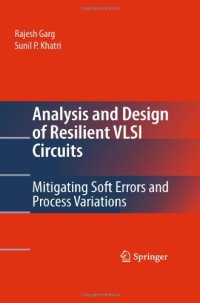
Ebook: Analysis and Design of Resilient VLSI Circuits: Mitigating Soft Errors and Process Variations
- Tags: Circuits and Systems, Computer-Aided Engineering (CAD CAE) and Design
- Year: 2010
- Publisher: Springer US
- Edition: 1
- Language: English
- pdf
This book is motivated by the challenges faced in designing reliable integratedsystems using modern VLSI processes. The reliable operation of Integrated Circuits (ICs) has become increasingly difficult to achieve in the deep sub-micron (DSM) era. With continuously decreasing device feature sizes, combined with lower supply voltages and higher operating frequencies, the noise immunity of VLSI circuits is decreasing alarmingly. Thus, VLSI circuits are becoming more vulnerable to noise effects such as crosstalk, power supply variations and radiation-induced soft errors.
This book describes the design of resilient VLSI circuits. It presents algorithms to analyze the detrimental effects of radiation particle strikes and processing variations on the electrical behavior of VLSI circuits, as well as circuit design techniques to mitigate the impact of these problems.
- Describes the state of the art in the areas of radiation tolerant circuit design and process variation tolerant circuit design;
- Presents analytical approaches to test efficiently the severity of electrical effects of radiation/process variations, as well as techniques to minimize the effects due to these two problems;
- Distills content oriented toward nuclear engineers into leading-edge algorithms and techniques that can be understood easily and applied by VLSI designers.
This book describes the design of resilient VLSI circuits. VLSI design has become more challenging recently, due to the detrimental effects of radiation particle strikes and processing variations. This book presents algorithms to analyze the effects of these issues on the electrical behavior of VLSI circuits and circuit design techniques to mitigate the impact of these problems.